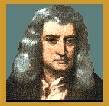|
PinkMonkey Online Study Guide-World History
The Scientific Revolution
During the 17th century Francis Bacon and
Rene Descartes had advocated and demonstrated that science
depends upon the observation of facts, rather than upon the authority
of ancient books. The scientists of the 18th century acquired these
methods of careful observation and patient experiments. They were
able to achieve great results.
Physics

Exhibit 5.1
Sir Isaac Newton
The most famous scientist in the later 17th and
early 18th century in physics was the Englishman Sir Isaac Newton.
Though Newton had several achievements to his credit, he is well
known for his discovery of the universal law of gravitation, the
pull by which every body is attracted to every other body be it
an apple from the twig or the earth to the sun. Like Newton, the
German scientist Leibnitz also applied mathematics in the
service of physics. Other renowned scientists were Franklin the
American, who is remembered in connection with the lightning rod
and Galvani the Italian, whose name is preserved in the ’galvanic’
battery. The ’voltaic’ cell or the battery was invented by Volta,
who was also a famous Italian physicist. More accurate forms of
the barometer and of the thermometer were developed in the 18th
century. They were also put to more practical uses at that time.
Biology
Highly important discoveries were made in biology,
the science of life, both with regard to plants and animal. The
discovery and description of the circulation of the blood in the
human body by William Harvey, a famous English surgeon in the 17th
century, enabled physicians in the 18th century to carry out a more
effective treatment of diseases. The Swiss scientist Albrecht Von
Haller earned the title of the ’father of modern physiology’. He
was the contemporary of Benjamin Franklin. Others who lived during
Franklin’s time were Buffon the Frenchman and Linnaeus the Swede.
They studied animals and plants extensively. Thus the new sciences
of zoology and botany advanced greatly. Later came Edward Jenner,
the English physician who proved that vaccination could prevent
the dreaded disease of smallpox.
|
Index
5.0 - Introduction
5.1 Growth and Features of the Revolution
5.2 The Rationalist Spirit and the Contribution of Voltaire
5.3 Application of the Critical Spirit
5.4 Age of Enlightened Despots
5.5 Dates & Events
5.6 Points to Remember
Chapter 6
|